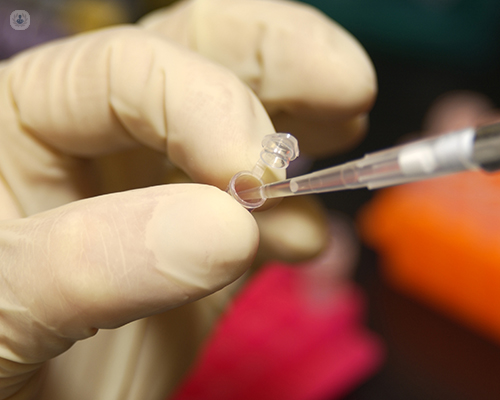DNA testing
Dr Melita Irving - Clinical genetics
Created on: 06-07-2018
Updated on: 11-10-2023
Edited by: Carlota Pano
What is DNA testing?
DNA testing has become somewhat of a trend in recent years. Testing is available for genealogy, skin care, health plans, and fitness plans, all based on your DNA. However, many of these tests are not medically reliable.
In medicine, DNA testing should be backed with support from a professional along with genetic counselling support. DNA testing results should be confirmed in a clinical setting before taking any type of medical action.

What does DNA testing involve?
When DNA is tested, you will usually provide a cheek swab and blood sample for testing purposes. These are sent to a laboratory for analysis.
If you are having an amniocentesis or chorionic villus sampling (CVS), the method of extracting a DNA sample differs. For an amniocentesis, a thin needle is inserted into the uterus to obtain a sample of amniotic fluid. For CVS, a sample is taken from the placenta.
Why is it done?
Whilst there has been a recent uptake in at-home DNA test kits, which claim to test for your risk to certain diseases, many of these should be taken with a pinch of salt because they are not done in a medical setting and do not have the support of clinical geneticists.
However, DNA testing for medical purposes is used for the following purposes:
- Prenatal screening (amniocentesis or chorionic villus sampling)
- Preimplantation genetic diagnosis (before in vitro fertilisation)
- Paternal testing
- Carrier screening
- Pre-symptomatic testing (e.g. to estimate the risk of a certain disease or condition)
- Diagnostic confirmation
Preparation for DNA testing
Generally, there is no preparation needed for DNA testing, but prenatal screening methods may require certain preparatory steps, which your specialist will confirm.
However, if you are being tested for a potentially life-changing condition, a genetic counsellor will help prepare you for this, making sure you are informed about how testing works and that you understand what you are being tested for. Genetic counsellors also inform you about how a condition could affect you. They will then advise you on treatment and management options following your test, referring you to the relevant specialists.
What do abnormal results mean?
Test results will differ in meaning depending on why your DNA is being tested.
If it is part of your prenatal screening, then it may indicate whether your developing baby has a genetic condition.
If it is preimplantation genetic diagnosis, results will indicate whether the embryo is healthy or not to implant as part of the in vitro fertilisation (IVF) round.
If you are being tested for certain genetic mutations that can predispose you to certain conditions - for example, carrying the mutation of the BRCA1 and BRCA2 genes predisposes you to developing breast cancer - the results of testing may influence your decision to take preventative measures.
It is important that results from any form of DNA testing are communicated by a medical professional in a medical setting, and are not at-home kits that provide results via the mail.


